The most cherished family recipes help us turn longing for loved ones into comfort. My grandmother’s Slovak Easter bread we call “pascha” has been my go-to since 2020.
The heels of my hands push the sweet, yeasty dough away against the kitchen counter. Then fold it back over toward me. Pushing and pulling, pressing and gathering. Over and over. With every motion, tension leaves my body for the mixture — making both better.
Kneading the bread dough hooked me on making my grandmother’s recipe for the Slovak Easter bread we call “pascha.” Bronzed, plump loaves embracing golden raisins emerge from the oven. A warm slice slathered with butter is heaven.
But the kneading, and what happens as I knead, is why I make this bread, even when time is short.
In those five minutes, the shaggy, sloppy mess of flour and butter, milk and yeast, vanilla, eggs and golden raisins becomes a smooth, elastic dough, ready to rise. The alchemy of kneading transforms the flour’s gluten into a structure for those lovely pockets and bubbles produced by the yeast. That’s the chemistry.
And I feel better and stronger. That’s the magic.
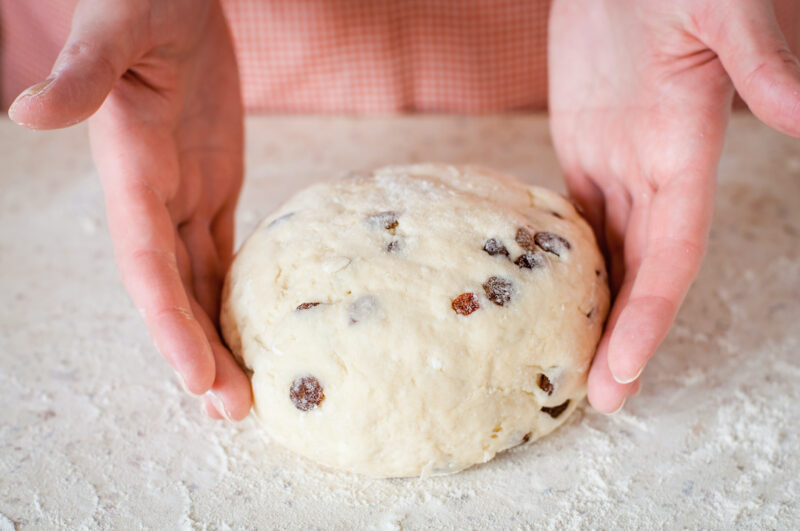
Spring 2020: Isolation and Anger
Truth be told, when I first made this bread in the spring of 2020, I was angry.
I’m not much of a bread-baker. In the early weeks of the pandemic, that bread-baking trend swept past me like a parade. Charming and sweet — just not something I jumped into.
But then, a few days before Easter, I thought making it might help. I felt isolated and angry over all the disruption, sad over the mounting death toll, afraid of losing people close to me. Weary of trying to make the best of it.
And overwhelmed with empathy for our kids. A lost baseball season. Our daughter-in-law’s meticulous wedding planning thrown into shambles.
When families should have come together, they could not. We could not have our typical big family dinner for Easter. My mom was buttoned up in her house, and I in mine. Church was closed and so many of us struggled without our typical connections. Without hugs.
(Read: I Believe in Infinite Love Above All Else ~ Some Thoughts on Faith.)
The Power of Bread
Needing the strength and comfort of my mom, grandmother and our family, I attempted the pascha bread that Easter. My mom makes this traditional Easter bread on Good Friday whether she is visiting me in central Pennsylvania or, when I was a kid, at home in Cleveland or visiting her sister in upstate New York.
When separated from loved ones, perhaps the best way to cope is to make a cherished family recipe. Even better: One with the power to turn anguish into comfort and connection.
When you are separated from loved ones, perhaps the best way to cope is to make a cherished family recipe. Even better: One with the power to turn anguish into comfort and connection.
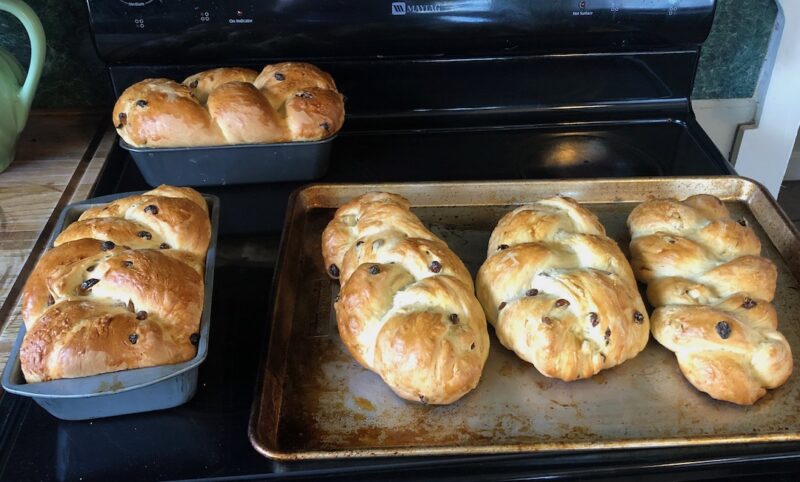
Plump “Pascha”
So in 2020 I pounded the hell out of that bread dough and sent baked loaves out in Easter baskets to my in-laws and local family who would normally be at our holiday table.
“Scrumptious,” was my niece’s review and that pleased me.
The bread is sweet, made with eggs and golden raisins and braided into five plump loaves. Its origins are in Eastern Europe, and it’s likely a relative of challah or brioche.
Our family calls this recipe “pascha,” the Greek word for Easter. My mom and uncle both make it that way, as close to how their mother — my grandmother — made it. So that’s how I make it.
My grandmother “Sweetie” was kind and tough, a badass who wore combat boots. I remember this when needing strength.
Escaping a Tough Town
My grandmother, Magdalene — nicknamed “Sis” — grew up in a small, railroad town in the mountains of Northeast Pennsylvania. To shake free of the hard life in Mauch Chunk, she became a nurse, joined the Red Cross and served as an Army nurse in World War II.
My grandfather, Emil, grew up in Cleveland and served in World War II on an anti-aircraft unit, then worked on building bridges. He had lost his mother as a boy. They both had kid brothers.
They met in England. At a dance, I think. My grandmother told me once, long ago during an interview we did for a college class. She was just a touch wistful, but mostly matter-of-fact. Done deal. She quickly moved the conversation onto their children: My mother was their first-born, my older uncle, my aunt, and my younger uncle— the baby of the family who also makes the pascha bread at Easter.
By the time we had that talk, Emil and Sis, my grandparents, had been married 47 years and raised four children in a suburb east of Cleveland. I am the eldest of their 10 grandchildren, born into their love story.
Spring 2021: Miracles & Shared Connection
A year later, 2021, we had the medical miracle of vaccines. Hallelujah!
I’d had my first shot. But we held off from our typical big family gathering for Easter. Again, I made the pascha and shared the baked loaves.
When I posted some pictures on social media, my cousin remembered the bread from when we were both kids and my mom, his aunt, visited over Easter. Another comforting connection.
I dove into my stash of cookbooks and the web, searching for the recipe’s origins and found a lot of similar recipes — but not yet one that exactly matches our family recipe. You’re likely to find versions of this bread wherever Eastern European immigrants settled in the US.
Perhaps that is part of our life’s mission, to find what helps us turn life’s darkness and raw ingredients into something that is beautiful and useful.
Symbolism and Ritual
This baker makes her “Paska,” Slovak Easter bread, in a round pan with the braids on top. The braids are said to symbolize the holy Trinity. In the “New York Times Heritage Cookbook” by Jean Hewitt (Random House, 1972) the recipe for Ukrainian Easter bread is a pretty close match, but adds lemon, cherries and walnuts.
This one, called “Vánocka” from the Czech Republic is for a braided brioche flavored with rum and lemon zest, raisins and almonds.
We keep it simple — golden raisins only.
Vánocka is the Czech word for Christmas. The braids are said to symbolize baby Jesus snugly wrapped in cloth strips.
Apparently, according to Taste Atlas, when you’re making Vanocka, it’s customary to jump up and down and think of dear friends and family while the dough is rising.
Maybe I’ll add that to my ritual. For me, the bread is more closely related to the darkness of Good Friday, and the coming transformation into the joy of Easter.
I pour my heartache into the bread dough and am rewarded by sweet, share-able loaves and the satisfaction of making order out of the mess of real life. Perhaps that is part of our life’s mission, to find what helps us turn life’s darkness and raw ingredients into something that is beautiful and useful.
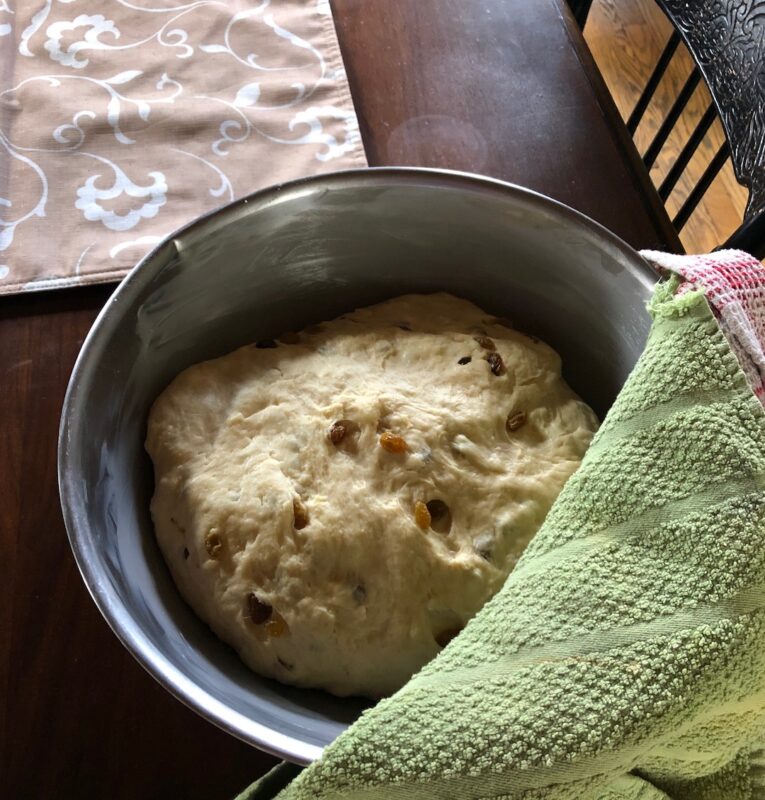
Spring 2022: Renewal and New Loss
This year was supposed to be our return to “normal” — whatever that means. My mom and stepfather had planned for many months to visit for Easter to meet our new, baby grandson.
Then —
The Tuesday before Easter, my cousin suddenly died at 44, plunging a branch of our family into grief. I don’t know what happened, and it’s not my story to tell. Our mothers are close sisters, and he is like a little brother to me. We connected over life and growing gardens and shared memories, and I am heartbroken.
And a tiny thread: He is my cousin who last Easter asked for the family pascha recipe.
On Thursday, my mom called to say she had immobilizing pain in her leg and could not make the trip for Easter.
By Good Friday, I was again pounding the hell out of the bread dough, pouring my grief and disappointment into it. (For some thoughts on grief, read: Take Good Care of You.)
Anguish Transformed
The loaves emerged golden and delicious. I felt better after the kneading, a little lighter and satisfied. A new connection brought comfort: Raw milk and fresh eggs from a new friend and the owner/farmer at Hameau Farm, in Big Valley, a connection to the land here in Big Valley — and because they are simply delicious ingredients.
My purpose when I started writing this was to learn the origin of this bread, its context, so I could pass on more than “just” the recipe to my cousin and his uncle, a dear relative who had also asked for the recipe.
Then I realized what making this bread has meant to me: Following the instructions of this cherished family recipe, working the dough as my mom, uncle, grandmother and unknown ancestors have all done before holds the power to turn my anguish into comfort and connection.
For me, that recipe is the pascha bread. In your family, it may not be bread at all — or perhaps a butter tart.
One Butter Tart at a Time
Late on the night of my cousin’s wake, I found myself in the unfamiliar kitchen of an Air BnB farmhouse near Poughkeepsie, New York, talking and baking with my cousin’s uncle, on his dad’s side.
He was determined to make his mother’s recipe for butter tarts. These are addictive, tiny pies made in muffin tins full of pecans and coconut baked within a sweet and sticky syrup.
No rolling pin to be found, he rolled out the pastry for each tart with a can of PAM and cut out each one with an upside-down teacup the same blue of a robin’s egg. He and his wife and I had the necessary hours to catch up and share stories about my cousin and all on our minds.
The kind of talking best done in person, with a shared task to keep your mind and hands busy and no deadline. Nana’s Butter Tarts offered comfort and connection at a painful time.
We will never be free from loss, or heartbreak. We work through our grief and go on and do our best. We control so little, only where we focus our energy and what we do with our pain. How we connect.
Life insists we move forward. There will be more sweetness. There will be more anguish and heartache, the comfort of connection, a return to sweetness through bread or butter tarts or something else entirely. There will be more life.
Does your family have a cherished recipe? I’d love to hear about it. Please leave a comment below.
Share this story using the buttons on the right.
Subscribe below to receive stories by email.
Pascha
(Christmas and Easter Raisin Bread)
Mix 1 quart whole milk and 6T sugar and microwave for about 3 minutes.
Check temperature. At <120o add 1 large cake yeast.
Let sit for 10 minutes, allowing yeast to work.
Mix the following like a pie:
1 cup unsalted butter (room temperature)
1 T salt
6 cups flour
Add yeast mixture to flour mixture.
Add 1 T vanilla
Add 3 egg yolks (save whites)
Add 1 box white raisins
Mix well. Add additional flour until soft dough forms that can be turned out on floured surface. (In all, recipe may take almost a bag of flour!)
Knead dough until smooth. Raise in a warm place until doubled. Punch down and let rise again until doubled.
Divide dough into five parts. Divide each part into three. Roll each piece into long shape and braid. Put in greased loaf pan.
Cover with towel and allow dough to rise again.
Beat reserved egg whites and brush on top of each loaf.
Bake at 350o for 45 min.
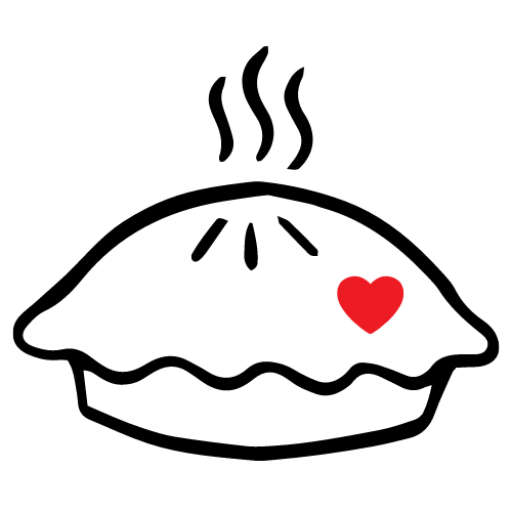
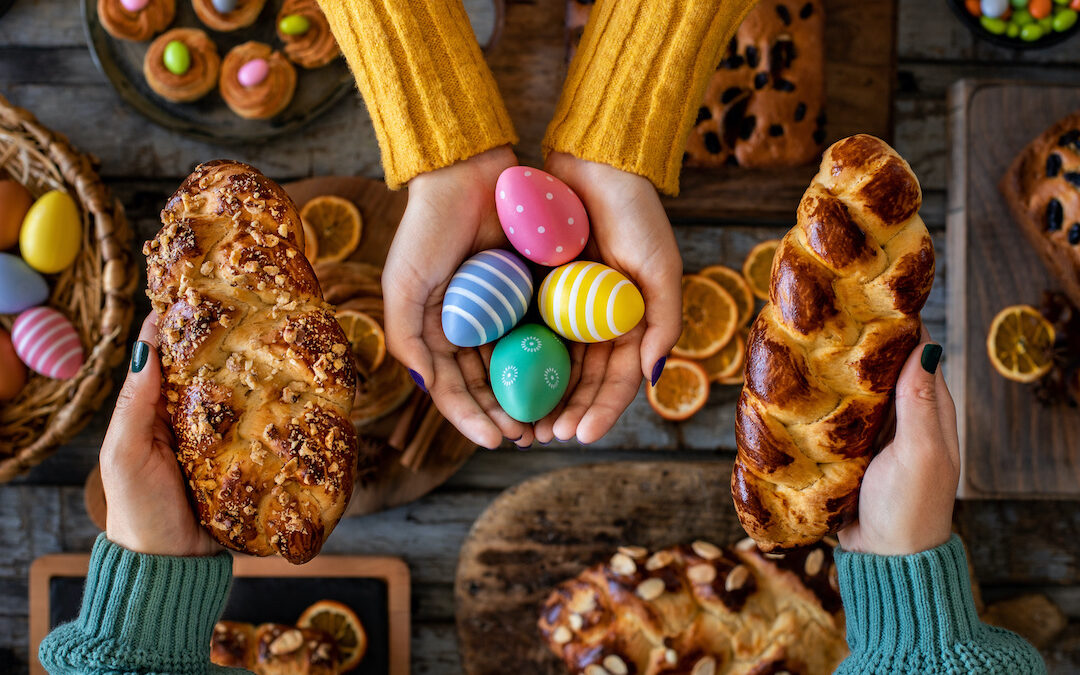
Oh Lisa! What a wonderful story teller that you are. Thanks so much for sharing your stories!
Such a touching story. You pour out your heart in your stories just as you pour out your soul into making bread. Your family Paska bread recipe is different than the one I have. I have not had or made any of my mother’s Slovak recipes in a very long time. Perhaps I should get out my baking pans.
Thank you so much, Diane. Feeling quite lucky to pour out my heart and soul! I suspect our family recipe was simplified over time — and it’s such a satisfying, healing connection for me. Let me know if you make bread — or any of your mom’s recipes!